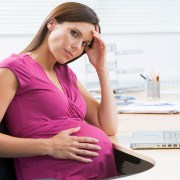 Photo: Getty Images
Photo: Getty Images
No one told you that getting pregnant would lead to more than just pickle and ice cream cravings. Alas, despite the wonderful physical effects of pregnancy--thicker hair, radiant skin, and of course the baby growing within--many women suffer not-so-wonderful symptoms as well.
Nausea, sore breasts, and bloating are well-known symptoms of early pregnancy. But not many women talk about the less glamorous symptoms that can occur as pregnancy progresses, particularly those associated with the digestive system.
Hormonal changes can lead to queasiness and morning sickness, particularly during the first trimester of pregnancy. Passing gas may become a more common occurrence. No, you are not the only one who’s experienced that embarrassing symptom!
In addition, because the uterus is growing, a woman’s stomach and intestines are somewhat displaced during the course of pregnancy. By 40 weeks, the stomach is actually vertical rather than horizontal. These changes can lead to heartburn.
Stomach discomfort is not uncommon during pregnancy. Some women experience loose stool. Others suffer from constipation—almost half of all pregnant women, in fact. A fiber-rich diet—25-30 grams of fiber per day—and drinking at least 10 daily cups of water or other fluids can help keep you regular. Eat plenty of fruits and vegetables as well as whole grains. Prunes and figs are particularly high in fiber.
Getting regular exercise can help prevent constipation. While your exercise regimen may be less intense than it was pre-pregnancy, walking, swimming or practicing yoga three times a week for at least 20-30 minutes can keep your digestive system running smoothly.
Constipation can irritate or even cause hemorrhoids, which affect 20-50 percent of pregnant women. A hemorrhoid is an enlarged, or varicose, vein in the rectum. These varicosities also can result from pressure as the uterus grows and increased blood flow to the pelvis. While not dangerous, hemorrhoids are uncomfortable. They can cause painful bowel movements and burning or itchiness around the anus.
Preventing constipation can help reduce the risk of hemorrhoids. You can also prevent hemorrhoids if you avoid pushing too hard when using the toilet, as this can cause a lot of strain in the rectal area. In fact, anything you can do to take pressure off the area will help prevent hemorrhoids. Try sleeping on your side, and change position throughout the day so that you don’t sit or stand for too long at a stretch.
If you do suffer from hemorrhoids, fortunately they are easy to treat, even during pregnancy. Apply cold packs to the area several times a day to relieve discomfort. Soaking in a warm bath can also provide a welcome relief. Keeping the area clean is important; use soft toilet paper or unmedicated wipes after a bowel movement. Cotton pads soaked with witch hazel can be applied to the anal area to reduce discomfort. Any medications should be recommended by your health care provider as safe to use during pregnancy.
Whether or not you suffer from the less glamorous symptoms of pregnancy, take heart in knowing that these too are preventable, or at least manageable. And as uncomfortable as these symptoms can be, they are small sacrifices for the gift of becoming a parent, which is the true joy of pregnancy.
Sources:






Add a Comment2 Comments
Oh my gosh!!! I had accidentally been using prep h on my sergical incision and was freaking out when I found out what is was. I googled it for information and found that people have been using it for years for incisions. Actually I think it helped with healing, itching and cooled it down.
March 14, 2013 - 4:01amhttp://www.hemorrhoids-guide.info
This Comment
Interesting post!
May 12, 2011 - 7:42amBeing a woman is not easy...
I found a ton of info on hemorrhoids on this website:
http://www.besthemorrhoidshometreatment.org/
I hope you'll find it useful as well.
Flo
This Comment